Building better code at Silverflow: Backstage, Soundcheck, and the power of gamification

Heading 1
Heading 2
Heading 3
Heading 4
Heading 5
Heading 6
Lorem ipsum dolor sit amet, consectetur adipiscing elit, sed do eiusmod tempor incididunt ut labore et dolore magna aliqua. Ut enim ad minim veniam, quis nostrud exercitation ullamco laboris nisi ut aliquip ex ea commodo consequat. Duis aute irure dolor in reprehenderit in voluptate velit esse cillum dolore eu fugiat nulla pariatur.

Block quote
Ordered list
- Item 1
- Item 2
- Item 3
Unordered list
- Item A
- Item B
- Item C
Bold text
Emphasis
Superscript
Subscript
tl;dr Payments processing platform Silverflow combined Soundcheck — Spotify’s scorecard plugin for Backstage — with in-office leaderboards to promote healthy team competition and healthier tech. It resulted in up to a 20% improvement in code quality across their org.
About Silverflow
Payment processing platform
Founded: 2019, Netherlands
Company size: 74
Engineering org: 50 engineers
Platform team: 4 (1 core Backstage developer)
Ecosystem: 100 microservices, ~20 production deployments/day
Tech stack: Node, Golang, AWS, OrgFormation, OpenSearch, GitLab CI, Grafana, Prometheus, Opsgenie
Backstage plugins: Software Catalog, TechDocs, Tech Radar, RAG AI Assistant, GitLab, Opsgenie, Spotify Plugins for Backstage (Soundcheck, Insights, Skill Exchange)
From startup to scale-up, and beyond
Silverflow is a new kind of payment processing platform. We’re a cloud-native solution with a single API to the card networks — “one platform with one connection” — greatly reducing the cost and complexity of processing payments. Founded in the Netherlands in 2019, we have since expanded from a team of one engineer (our co-founder) to 50 engineers.
At the time of writing, Silverflow is a company of 75 people, operating a complex ecosystem of approximately 100 microservices and averaging about 20 production deployments per day.

The platform team, which owns the Backstage service, consists of four people, with one individual serving as the core developer on Backstage and its associated features. On a weekly basis, around a third of our organization uses Backstage. It wasn’t always that way.
Shooting for the stars, without losing sight on quality
Transitioning from a startup to a scale-up is no small feat. As our organization grew, managing a larger number of services became increasingly complex. Security, compliance, and quality requirements added to the cognitive load for our engineering teams, and our old approach, scattered across various Confluence pages, simply could not keep up.
That changed when we introduced a more centralized system and made our progress visible to everyone in the office. By displaying performance metrics in plain sight, our teams were motivated to improve.
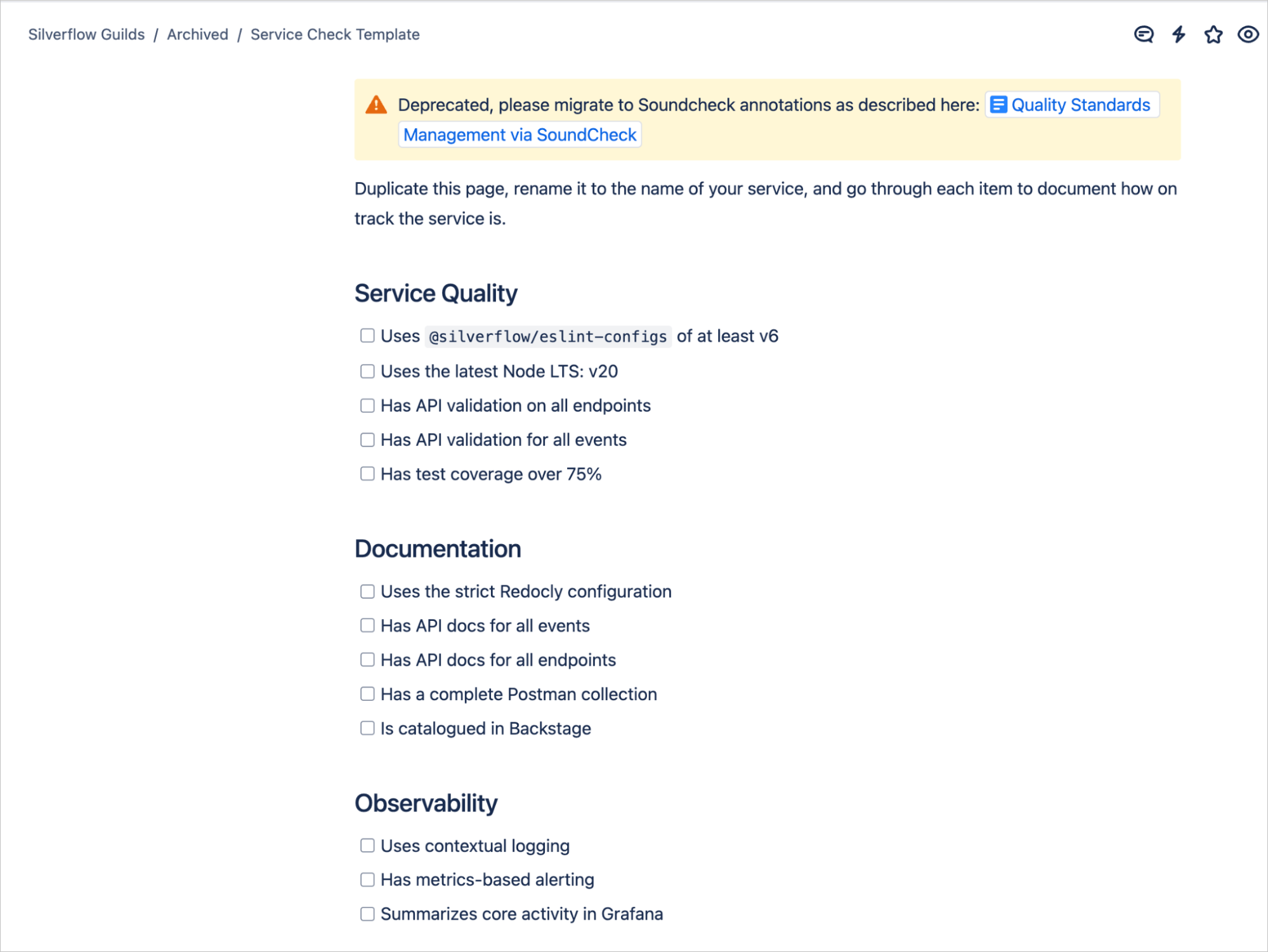
Within the first month of implementing this approach, we saw code quality improve by twenty percent for some teams. Here’s how we used Spotify’s Soundcheck Plugin for Backstage and in-office leaderboards to achieve these results, along with some lessons we learned along the way.
Why Backstage?
That’s what a lot of our engineers wondered at first, too.
At Silverflow, our engineering teams refine a set of quality standards on a half-year cadence via our Quality Guild. Maintaining uniformity across codebases ensures better collaboration through consistent practices.
Backstage, with its centralised catalogue — and then Soundcheck, with its structured approach — became the foundation for a scalable, streamlined model.
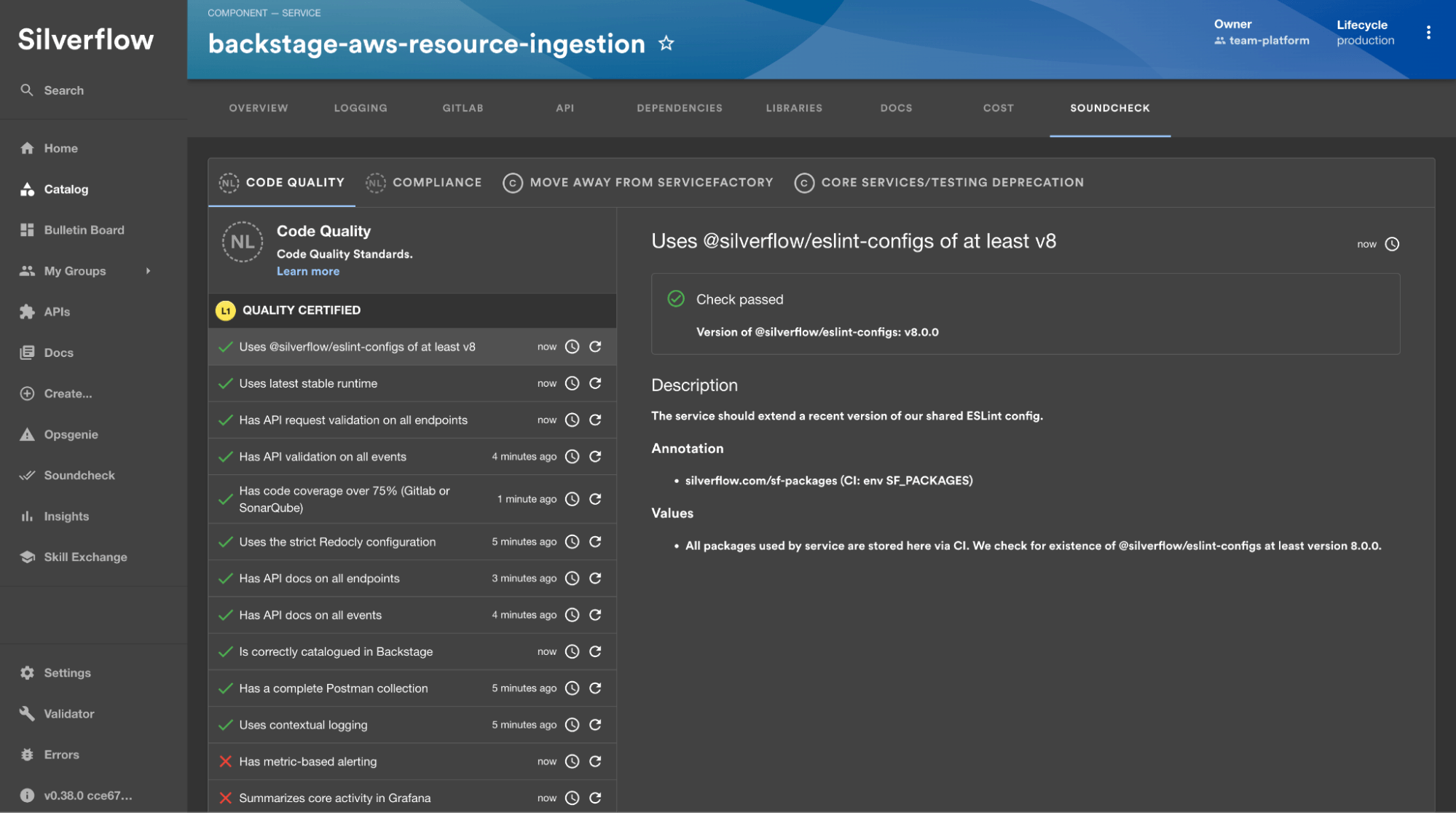
Initially, convincing teams to populate the software catalogue was challenging. Without Soundcheck, the benefits weren’t immediately tangible. However, when the quality track was launched, and later, the leaderboard, teams quickly recognised the advantages of having a centralised, curated view with a fun visualisation on how well their team is doing against others.
With increased organisation, teams were more likely to plan quality improvements into their sprints. Some even organised hackathon-style activities to focus on improving code health within the services they own.
How our code quality track works
The code quality track implements our quality standards as a mix of automated and manual checks, covering linting rules, documentation and validation requirements, and observability recommendations.
Manual checks are performed interactively via a CLI tool to ensure consistent application. These checks are designed to expire with each new version of our quality standards, preventing the risk of validating them once and never verifying adherence to updated standards later.
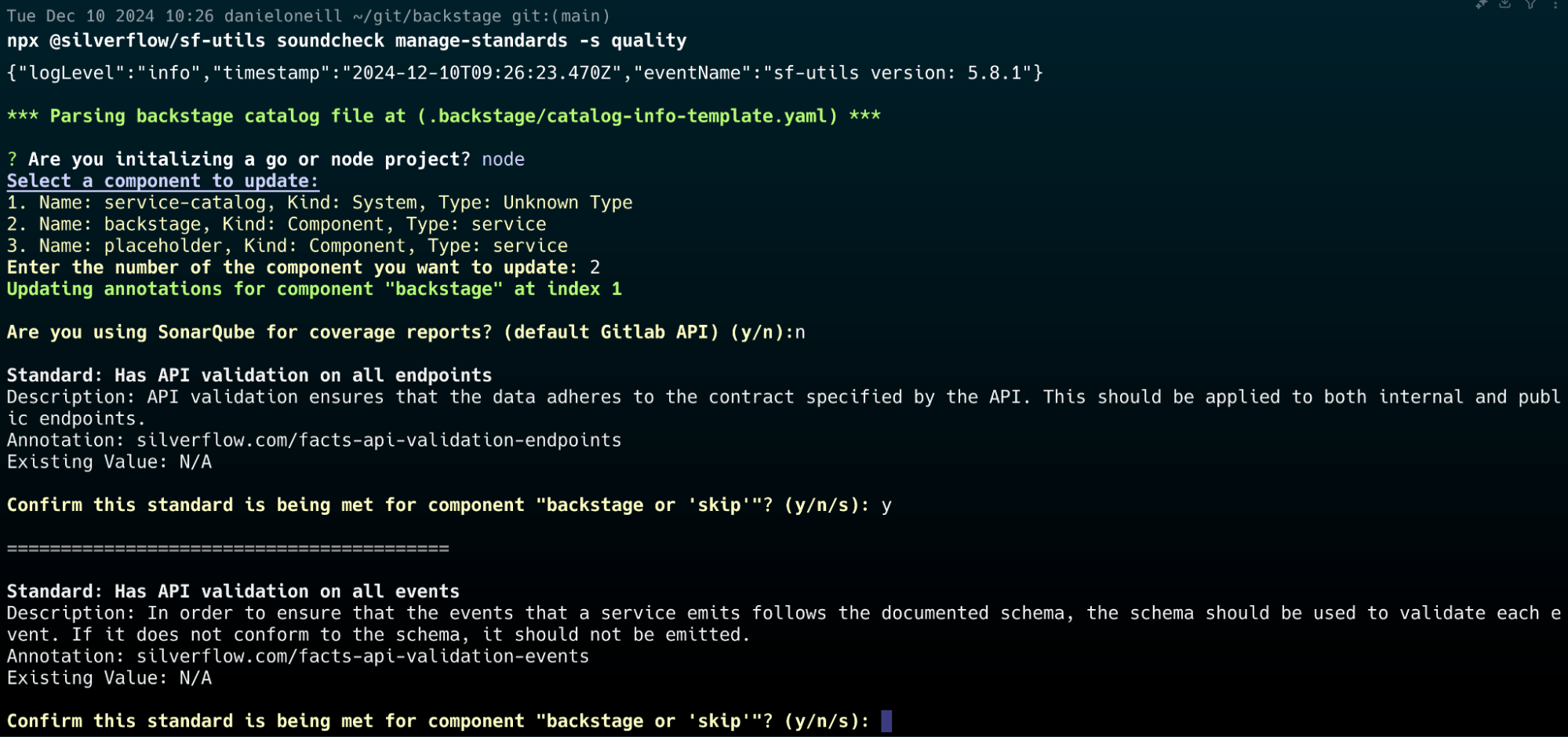
Gamifying code quality: Introducing the leaderboard
As Soundcheck became embedded in our workflow, we had the idea to introduce gamification to foster healthy competition. After all, being able to clearly see the quality of the components you own is one thing. But being able to see the quality of components that other people own can turn tech health into a team sport.
So we introduced a Soundcheck leaderboard. It ranks teams based on overall code quality and improvements over sprints. All we had to do was take the data from Soundcheck at the component level and visualize it at the team level.
How we built it
Leveraging our existing Grafana setup, we integrated Prometheus metrics from Backstage and data from Soundcheck’s Aggregations API. Since no suitable Grafana visualisation existed, we built a custom React panel to display the leaderboard, tailored to our needs.
To ensure reusability beyond Soundcheck, we designed the panel options to accommodate a broader range of use cases.
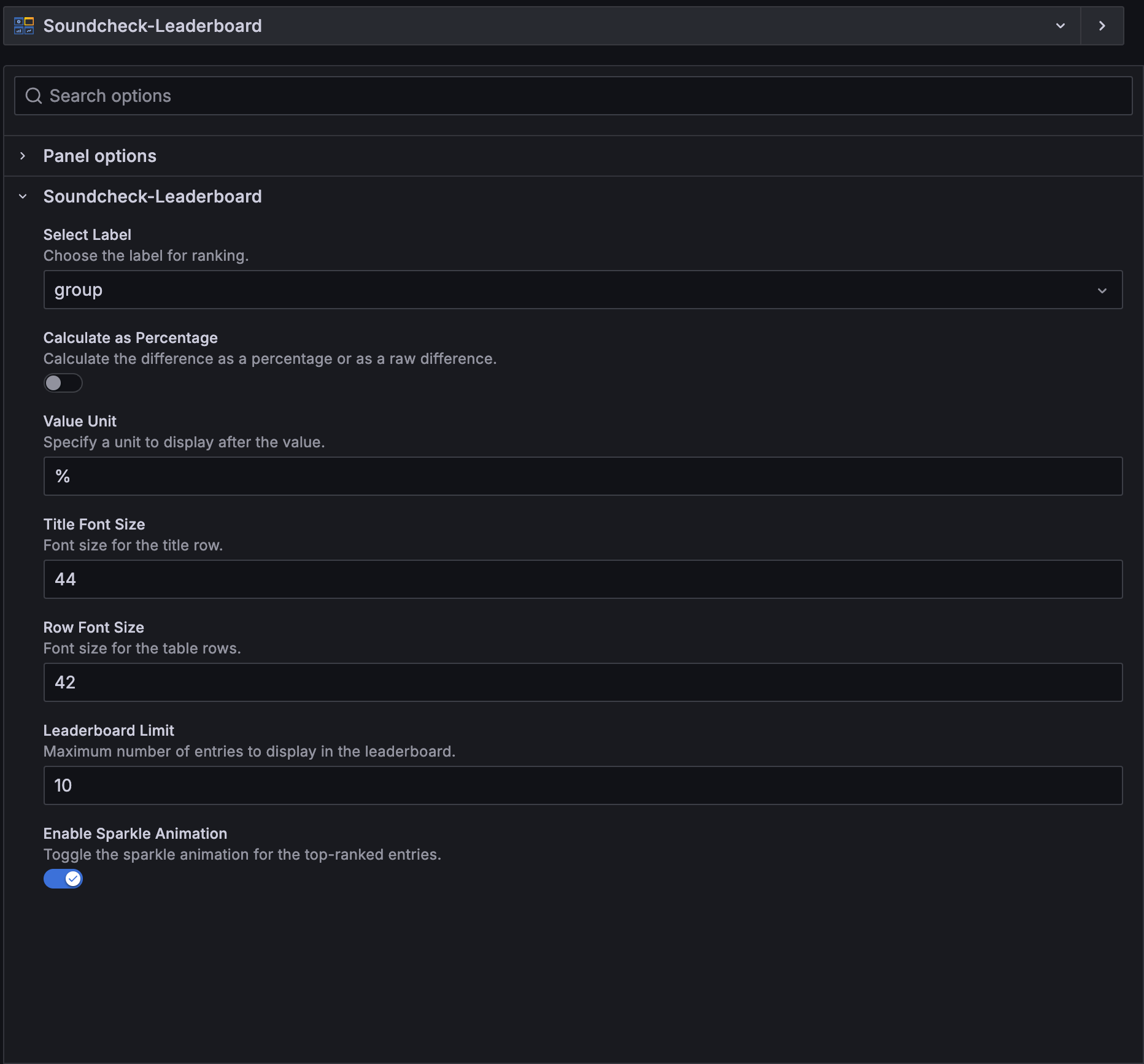
Up to 20% healthier tech
Prominently displayed on office TVs, the leaderboard quickly became a focal point. Teams actively worked to improve their standings, and within a couple of weeks, we observed up to a 20% improvement in code quality, with all teams making progress across the board.
Below is a pair of screenshots from the month following the leaderboard’s release. The first highlights a single team’s progress, while the second illustrates the leaderboard’s impact across the entire organization.


Beyond the metrics, the leaderboard sparked excitement across the office. Colleagues from non-engineering functions became curious and wanted to understand the meaning behind it. This created a new level of engagement between our engineering practices and the broader organisation.
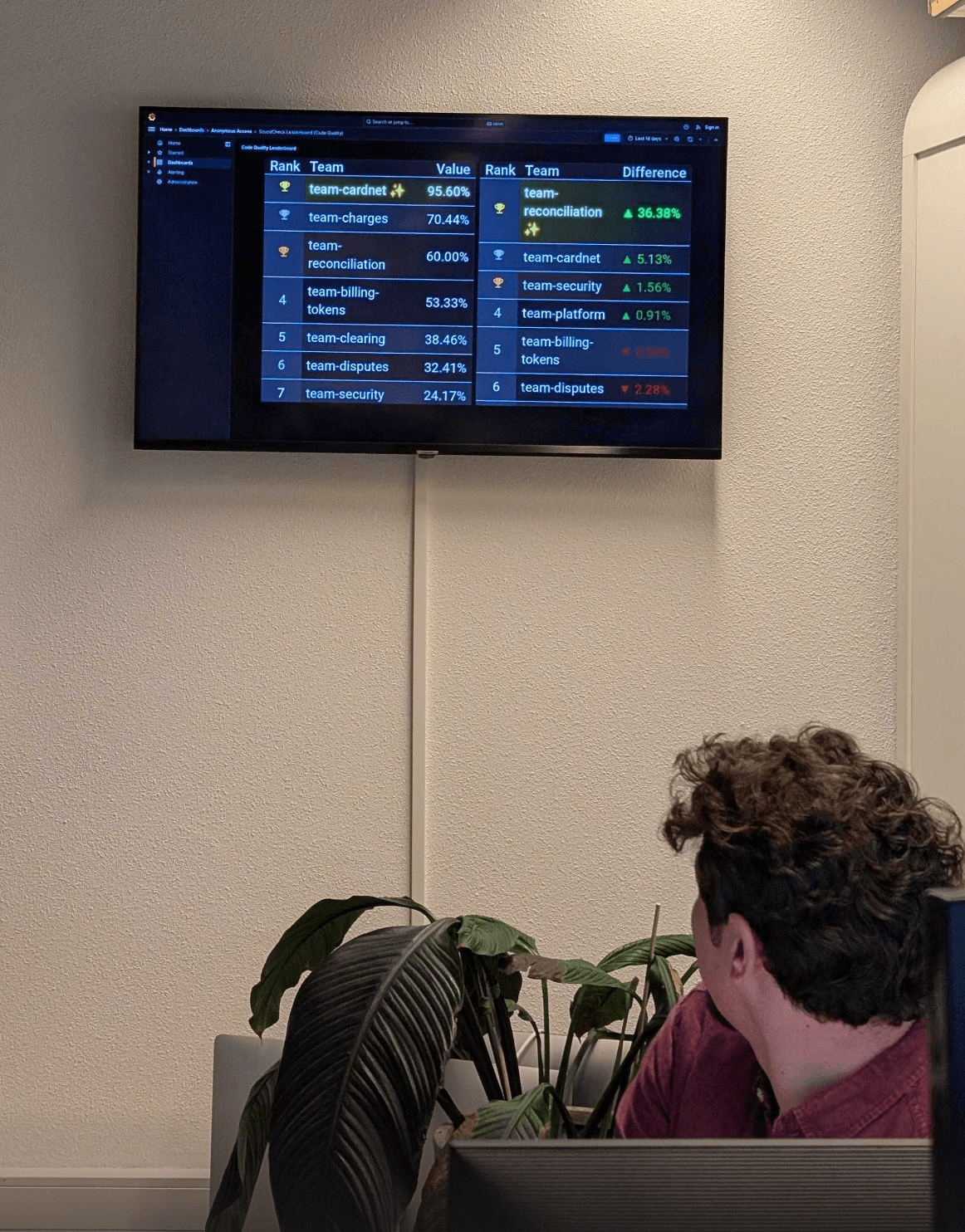
Future plans
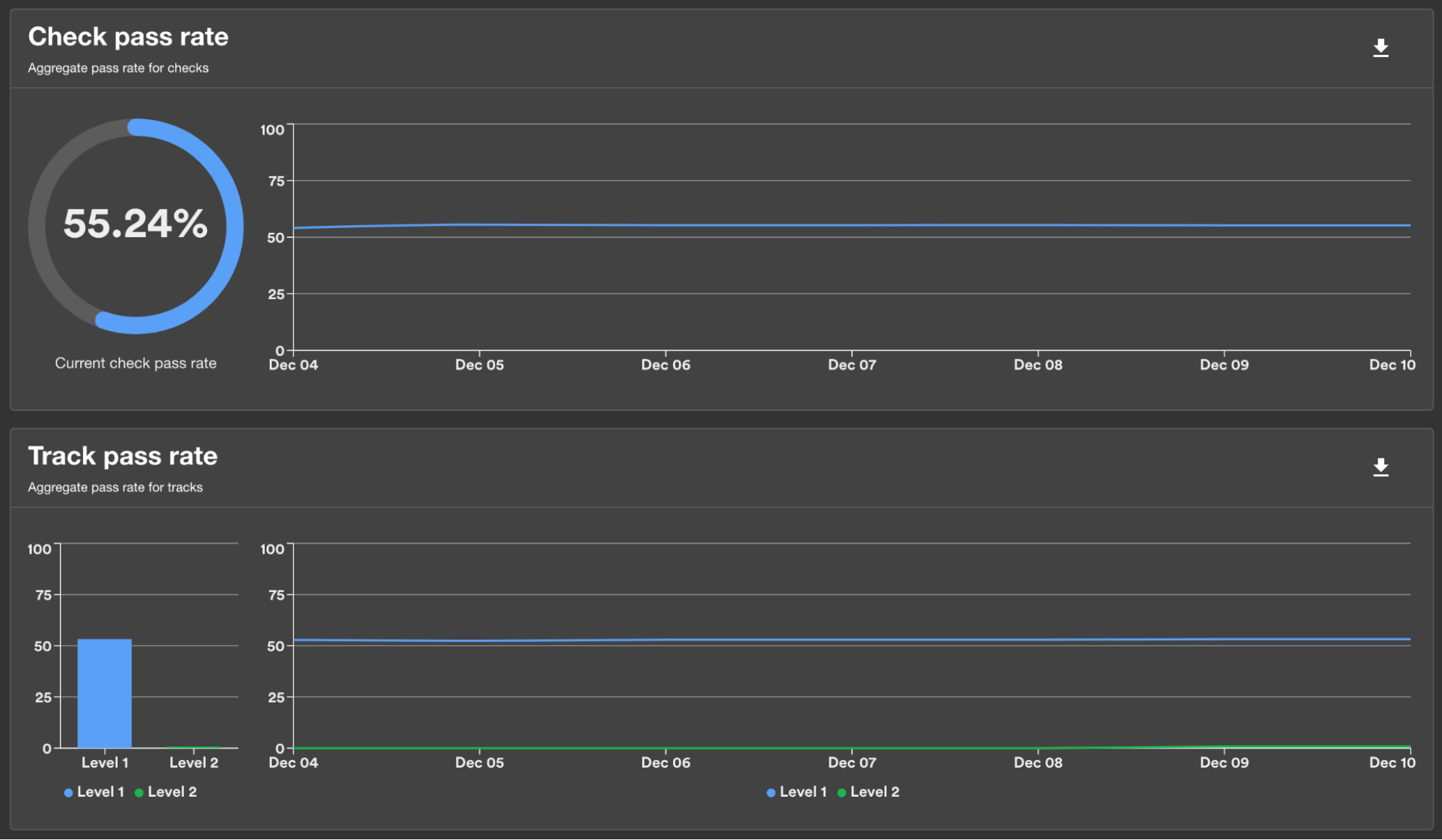
Looking ahead, we aim to expand our standards to include compliance automation and operational excellence. For audits, Backstage and Soundcheck will replace tedious evidence-gathering processes with data points from our checks.
Our tech health view can serve as a comprehensive audit report, simplifying the process for both teams and auditors. Additionally, we plan to introduce new standards to enhance service reliability and efficiency, further embedding operational excellence into our workflow.
Tech health is a team sport
Backstage and Soundcheck have not only streamlined how we manage and maintain code quality but have also redefined how teams perceive and engage with the process. By centralizing standards and introducing gamification, we've witnessed measurable improvements in code quality and team collaboration, while turning an often-overlooked task into an opportunity for innovation and pride.
Our journey demonstrates that investing in the right tools is more than just an operational decision — it’s a strategic move toward fostering a culture of excellence, collaboration, and accountability. These tools have become a catalyst for turning high standards into a shared mission, uniting teams around a common goal of continuous improvement.
Daniel O'Neill is a senior platform engineer at Silverflow. He enjoys solving problems and working together with people to bring value to any project that he is involved in. Besides tech health leaderboards, achieving great things together with other people is his greatest motivator. He also produces drum & bass music.
The Soundcheck plugin comes built-in to Spotify Portal for Backstage and is also part of the Spotify Plugins for Backstage bundle subscription.
